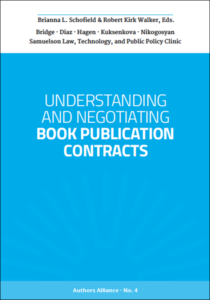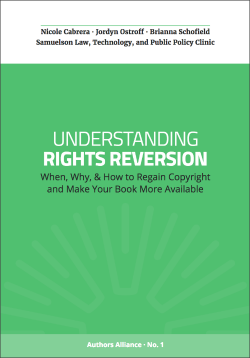This guide was adapted from Managing Copyrights & Negotiating Agreements by UC Berkeley Library Scholarly Communications Services, which is available under a Creative Commons Attribution-Noncommercial 4.0 License.
For further information about copyright for UC authors, see this site’s page on Understanding Copyright and the UC Copyright site.
Once you’ve written an article or a book, you will generally have to sign an agreement with a publisher before it gets published. The terms of these agreements vary widely, and control how you can use your own work later (including on your own websites, or in your own scholarship or classrooms). So, it’s in your best interests as an author to read them carefully and try to negotiate changes when necessary.
- Are you working on a publishing agreement you haven’t signed yet? If so, move on to the next section.
- Are you wondering what you can do under the terms of an agreement you’ve already signed? We have a section for you too – see “If you’ve already assigned your copyright, can you get it back,” below.
Please note that some authors can instead take advantage of the UC open access policies: As of October 23, 2015, scholarly articles (not books) written by any UC faculty member or other employee are covered by an open access policy unless the author obtains a waiver. Under these policies, authors grant a non-exclusive copyright license to the University for deposit in eScholarship prior to any later agreements authors may make with publishers. UC retains those rights regardless of what rights authors may subsequently transfer to publishers. The UC OA policies are intended to preempt or augment publishers’ default terms, granting UC – and by extension you – rights to share your article beyond what is allowed in a standard publishing agreement. Read more in the UC OA Policies FAQ.
What is your publisher asking for?
Publishing agreements are an exchange. Typically, journals’ publishing agreements will ask that you transfer or license your copyrights without financial compensation. In return, your work is published, receiving the visibility, prestige, and credibility associated with the journal. The publisher gains the ability to control how your work is published and can set terms and conditions for others to access the work (e.g. subscription prices, online access).

In the case of scholarly books, the publishing agreement transfer or license will typically involve a monetary transaction: You receive a lump sum or royalties based on how many books are sold, and the publisher receives rights to control the price of the books (if they’re not open access), the manner and terms of how the book is published, whether new editions or translations are created, etc. For a detailed guide to negotiating book contracts, see the Authors Alliance’s guide to Understanding and Negotiating Book Publication Contracts, available for free on the Authors Alliance website.
Publishing agreements can differ in many ways. For instance:
- They might ask for rights only for publishing in certain types of media (e.g. print books but not eBooks), or for certain periods of time or editions.
- They may ask you to transfer all of the exclusive rights you hold, or might not ask for a transfer at all, but instead merely a license to certain of your rights.
So, you’ll need to review the terms of your agreement carefully. As we discuss below, it’s really worth it to spend the time digging in to what you’re being asked to confer.
What do you want to agree to?
To determine whether you’re comfortable with the terms of the transfer or license, it is helpful to start by thinking about your goals for the work.
If you transfer ownership your copyright to a publisher, you are providing them with all your exclusive rights. You may be given back the right to do certain things with you work, but they won’t be as broad as the rights you had before you signed the agreement. You may even be asked to sign away rights to make uses that would otherwise be “fair.”
This could result in downstream frustration for you if, for instance:
- You later desire to have your book published as an eBook, or for a copy to be made available open access with a Creative Commons license, but you have assigned all copyright to your publisher.
- You wish to commission a translation, but your publisher is now the only one who can authorize the publication of one.
- Depending on how similar your later works are to the work covered by the agreement, these might count as “derivative works”— and the right to create them may have been assigned to your publisher.
Assessing your future intentions before you sign your agreement will better position you to be able both to understand and negotiate the rights or licenses they’ve asked you to confer.
What are your negotiating options?
Once you figure out what future uses you do or might want to make from your work, you can explore what options you have to preserve necessary rights. It may not always be possible to successfully negotiate changes to your publisher’s agreement. You will likely find publishers more willing to negotiate about book contracts than journal contracts; you may find commercial or large publishers more willing to alter terms than nonprofit or smaller publishers, but you won’t know for sure until you try.
Generally speaking, there are a few main approaches you could take:
Transfer Your Copyrights But Reserve Certain Rights or Licenses for Yourself
- If you already know exactly what kinds of uses you want to make—such as posting to a personal or departmental website, making a later derivative work such as a translation, etc.—then you can try expressly adding or building in this planned use into the agreement. One way to do this is by adding language like the following after the sentences or paragraphs in which transfer occurs: “Notwithstanding the foregoing…” or “Except that nothing in this paragraph shall limit [author’s name] right to…,” and then specifying the rights you wish to retain. Likewise, if you’re being asked to provide “exclusive” rights that would prohibit you from making certain uses of your own work that you know you want to make, you may wish to strike this language and insert “non-exclusive” for these particular rights.
- You can also expressly include what are called “reversion” or “out-of-print” clauses. These clauses assign copyright to a publisher for only as long as the work is still “in print”—after which point, copyright reverts to the author. Of course, agreements differ in how they define out-of-print, and there’s a great FAQ section by the organization Authors Alliance that discusses this. Reversion clauses can be incredibly useful to ask for if they are not already built into your agreement, because they streamline the process for getting your rights back if the publisher decides, for instance, to stop publishing your book. The reversion clauses will probably differ in terms of the “triggering” event, and the steps you must take to exercise your reversion right once the triggering event has occurred.
Retain Copyrights But Grant Certain Licenses to the Publisher
- Alternatively, you might be able to negotiate for retaining your copyright and instead granting certain exclusive licenses to your publisher. Some publishers may be satisfied with, for instance, being given “exclusive worldwide first publication rights” in certain or all languages. Granting a “first publication” license can mean you get to keep rights to do other things with your work, such as posting copies to your website, creating adaptations or books that incorporate the original manuscript, etc.
If you’ve already assigned your copyright, can you get it back?
Sometimes, you can get rights back even if you’ve assigned them away.
Getting Rights Back By Contract
Some book publishing agreements include contractual provisions that permit authors to work with their publishers to regain some or all of the rights in their books when certain conditions are met, such as sales drop below a certain number. The Authors Alliance has a detailed guide explaining what to look for and how to work with publishers if your contract has one of these provisions, Understanding Rights Reversion: When, Why, & How to Regain Copyright and Make Your Book More Available. The guide is available as a free download from their website, or you can order a print copy.
Even if your publishing agreement doesn’t expressly have a reversion clause, you could try negotiating for rights reversion with your publisher anyway—particularly where your work is a book that is out-of-print or circulation. Publishers might be willing to assign rights back to you if they have no future commercial plans for your work.
If you are interested in regaining copyright ownership in, or getting greater rights to use, a journal article for which you signed a publishing agreement years ago, you’ll likely have a harder time. Subscriptions to older journal content is often still a source of revenue for publishers, and journal publishers may see no incentive to negotiate with you about rights for a single article in their vast collection.
For a great guide on how to later negotiate a reversion of rights, even if the publishing agreement you signed didn’t contain one, check out Chapter VI of Authors Alliance’s guide Understanding Rights Reversion (pp. 70-100). You can also try Columbia Law School’s Keep Your Copyrights Guide—in particular, the section on Termination.
Getting Rights Back By Statute
Alternatively, there is a (somewhat-complicated-to-assert) right that arises automatically under copyright statutes. This is called Termination of Transfer.
For works created after 1978, Section 203 of the Copyright Act allows for the termination of transfer after a certain period of time has lapsed. But the conditions to exercise the right are strict.
Here’s the 20,000-foot overview:
- A 5-year window opens 35 years after you have transferred your copyrights (or, if you have granted certain publication rights, then 35 years after publication or 40 years after the grant of those rights—whichever comes first).
- During that 5-year window, you can obtain a termination of transfer. But…
- …to trigger termination within that 5-year window, you first have to have given advance notice to the transferee. Specifically, the author or certain heirs must issue a notice giving at least two (but no more than ten) years’ advance notice of the termination date. Further, the Copyright Office has issued rules detailing what must be included in such a termination notice.
Because the statutory operation of these provisions is complicated, Authors Alliance and Creative Commons have tried to make it easier for authors to determine whether they qualify for termination of transfer rights. You can get started with their Termination of Transfer Tool. As they explain about the tool:
If a termination right might exist, the tool estimates – based on the information you provide – when the termination right might be exercised. The tool gathers this information along with some basic details about the work that might be useful and relevant to preparing the “termination notice” required to officially start the termination process.
If you’re interested in learning even more about the statutory Termination of Transfer, you can check out:
- Columbia Law School’s Keep Your Copyrights
- The U.S. Copyright Office’s Termination of Transfers & Licenses Under 17 USC § 203
- Authors Alliance’s Authorship & Ownership FAQ
More Help
We can’t give you legal advice, but we can help you understand issues and find more resources. Please contact us at osc@ucop.edu.
You might also want to check out these excellent guides:
- Authors Alliance’s Understanding Rights Reversion
- Columbia University Law School’s Keep Your Copyrights
- Arizona State University Library’s Negotiating Guide: How to Retain Ownership of Your Copyright When Dealing with Publishers
- University of Iowa Library’s Author Rights




